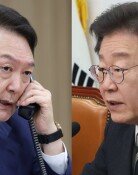An excuse for China
An excuse for China
Posted December. 29, 2017 07:59,
Updated December. 29, 2017 08:20
Giving a speech at Peking University during his state visit to China on December 15, South Korean President Moon Jae-in mentioned the popularity of Chinese lamb skewers and Tsingtao beer among South Korean youths, garnering a round of applause from the young audience. While the apparent intention was to win the heart of younger population in China by stressing the importance of cultural exchange between the two countries, President Moon may have been oblivious to the fact that these days lamb skewers are something of a rarity in the streets of China. The Chinese authorities are imposing a strict clampdown on street vendors as they are considered as one of major causes of fine dusts.
Starting from the year of 2017, the Chinese government imposed a ban on coal heating, which affects three million households in 28 cities, including Beijing, Tianjin and Hebei. In practice, it entails physically removing coal-fired boilers from each of the households and facilities in the designated areas. Forced to use natural gas instead of coal, poorer households are facing bitter hold this winter owing to inadequate gas supplies. The approach suits the nature of a communist country conveniently turning a blind eye to human rights to achieve the goal of improving air quality.
In fact, the harsh measures that the Chinese government is taking are for its own benefits rather than its neighbors. If such measures were to take place in South Korea, it would have prompted candlelight protests if not riots. However, the regulation is paying off, and the once notorious Chinese smog is showing signs of dissipation. The Environment Ministry of South Korea analyzed that the high-levels of fine dust in metropolitan areas during the Christmas holidays were attributable to “high humidity and prolonged atmospheric stagnation” while some amount of the micro dusts travelled from China. It was news that may well silence the China-bashers who blamed the country for having a “Grey Christmas.”
Analyzing fine dusts is so intricate that getting a grasp of it is challenging for laypersons. The good news is that President Moon Jae-in is more interested in fine dust than any other presidents that South Korea has ever had elected. Merely five days after inauguration, President Moon visited an elementary school on May 15 and announced a suspension of operation of eight decrepit coal-fired power plants as his third task order. President Moon also promised to install fine dust meters at school so that students can enjoy the outside without worrying about their health.
However, a personal interest does not necessarily translate into a step into the right direction. While the suspension of old power plants in June was welcome news, the actual cut in the amount of fine dust in July was meager. The proposed installation of fine dust meters was dropped as well after facing the criticism questioning the need of “measuring” fine dust levels instead of cutting them. It was one of the latest episodes that added to the amateurism of the Moon administration.
Indeed, Moon’s pledge to reduce the amount of fine dusts by 30 percent invited skepticism from experts. A 30 percent cut is a goal that is only reachable when the entire Korean economy comes to a halt for a while. Reduction of fine dust is such a tough task that cutting it 3 percent during his term would be a major presidential achievement for Moon. Suspending the operation of several old power plants is far from sufficient; he may have to shut down all restaurants using charcoal fire in South Korea. Cooking mackerels produces fine dust just like charcoal-fired lamb skewers.
If President Moon were to set the matter of fine dust as a presidential agenda, the first order would be finding the best expert in the field. It is hard to say that Kim Eun-kyung, the incumbent environment minister, is a fine dust expert. Japanese Prime Minister Shinzo Abe designated Japanese Health Minister Katsunobu Kato as the “minister for 100 million active people” to address the country’s falling birth rates, which is an approach worth benchmarking for South Korea. It takes “dust busters” to curb fine dust just like it takes ghostbusters to dispel ghosts. In fact, fine dust and ghost share some similarity in that both are invisible yet menacing.
Headline News
- Med professors announce intention to leave hospitals starting Thursday
- Bridge honoring Sgt. Moon Jae-sik unveiled in Pennsylvania
- Chief of Staff Chung tells presidential secretaries to stay away from politics
- US FTC bans noncompete agreements
- N. Korea launches cyberattacks on S. Korea's defense companies







